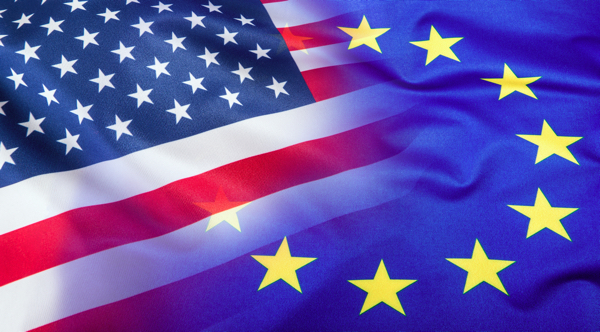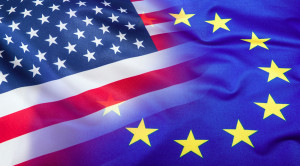
Wednesday July 25: Five things the markets are talking about
Euro equities have found some support, following Asian stocks as earnings season continues, although trade tensions remain to the fore ahead of today’s meeting between President Trump and E.C chief Jean-Claude Junker.
Most G10 currency pairs trade in a tight range awaiting today’s development from the U.S/EU meeting. In fixed income, most U.S Treasuries prices have edged a tad higher along with E.U government bonds.
Markets are struggling to build on Tuesday’s upbeat session as trade relations worries between the world’s biggest economic powers return to the fore.
Elsewhere, the AUD (A$0.7419) has had a mixed reaction with G20 currency pairs after inflation data missed estimates last night, backing the case for the Reserve Bank of Australia (RBA) to keep interest rates at a record low. The pound (£1.3155) is currently on to gains initiated by PM May taking control of Brexit talks.
In commodities, crude prices are higher, supported by lower inventory levels.
On tap: As the week continues, more corporate earnings come on line, while the ECB’s monetary policy will be the markets focus on Thursday. On Friday, Trump and his economic team are increasingly convinced the GDP numbers will be strong – he expects Q2 GDP to rise to as much as +4.8%!
1. Stocks get the green light
Overnight, Japanese stocks rallied for a second consecutive session, supported by gains in steelmakers and metal producers, as the market welcomed China’s pledges of a more forceful fiscal policy.
The benchmark Nikkei share average rallied +0.46%, expunging a significant of Monday losses on hearsay reports that the BoJ may adjust its policy at next weeks monetary policy meeting (July 30/31). The broader Topix gained +0.47%.
Down-under, Aussie stocks underperformed as the major banks faltered again following a soft CPI print. The S&P/ASX 200 fell -0.3%, with only the resources sectors showing a meaningful gains, supported by higher commodity prices. In S. Korea, the Kospi struggled overnight, barely getting back into positive territory. The benchmark fell -0.3% to move back toward its 14-month lows. Drug stocks were a noted sore point, while tech stocks eliminated those declines.
In Hong Kong, stocks rallied overnight led by the energy sector as investor sentiment improved on signs that the PBoC is loosening monetary and fiscal policies to prevent a domestic economic slowdown. The Hang Seng index rose +0.9%, while the China Enterprises Index also gained +0.9%.
In China, equities ease after three-straight days of gains. The blue-chip CSI300 index ended down -0.1% while the Shanghai Composite Index also eased -0.1%.
In Europe, regional bourses trade mixed amid another busy day for earnings.
U.S stocks are set to open in the ‘red’ (-0.1%).
Indices: Stoxx600 -0.1% at 388.0, FTSE -0.6% at 7659, DAX -0.2% at 12662, CAC-40 +0.2% at 5444, IBEX-35 -0.3% at 9742, FTSE MIB +0.1% at 21,897, SMI +0.1% at 9016, S&P 500 Futures -0.1%

2. Oil rises as U.S crude inventories fall, gold higher
Oil prices remain supported after U.S data yesterday showed that domestic crude inventories fell more than expected last week, easing worries about oversupply.
Global benchmark Brent crude was up +50c, or +0.7% at +$73.94 a barrel, after gaining +0.5% yesterday. U.S light crude is +5c higher at +$68.57, having risen nearly +1% in its previous session.
API data yesterday showed that U.S crude inventories fell by -3.2M barrels in the week to July 20 to +407.6M barrels. Consensus was expecting a decrease of -2.3M barrels.
Dealers will take their cues from today’s DoE report (10:30 am EDT).
Ahead of the U.S open, gold prices have inched higher as the ‘big’ dollar held steady ahead of today’s U.S and E.C meetings. Spot gold is up +0.2% an ounce. U.S. gold futures for August delivery are +0.1% higher.

3. Yields play in a tight range
Most sovereign bond yields continue to consolidate as dealers search for fresh impetus to head in a new direction. The economic calendar provides no new hints ahead of tomorrow’s ECB meeting.
However, today’s meeting between E.C Commission President Jean-Claude Juncker and President Trump could fuel further trade concerns, while cross-market themes and the lack of market liquidity can still provide erratic price moves.
The yield on U.S 10-year Treasuries has dipped -1 bps to +2.94%. In Germany, the 10-year Bund yield has fallen -1 bps to +0.39%, while in the U.K, the 10-year Gilt yield has decreased -1 bps to +1.264%.

4. FX markets trade sideways
The FX market trades in a tight range ahead of the today’s key Trump/Juncker trade talks stateside.
The EUR/USD (€1.1703) is slightly higher, but contained within this months trading range. E.U data continues to take the back-stage ahead of tomorrows ECB policy decision.
Note: The ECB is widely expected to leave its key policy settings and guidance unchanged after it announced its plans for monetary policy beyond September last month
USD/JPY (¥111.14) is holding above the psychological ¥111 level as fixed income dealers price-in that the BoJ would not likely make any policy changes until at least October.
Elsewhere, China is letting the yuan slide primarily to combat a slackening economy, as the government rolls out more pro-growth measures amid an intensifying trade feud with the U.S.

5. German July Ifo business expectations lowest in four-months
German data this morning revealed that domestic business expectations fell further this month, albeit only marginally, according to the Ifo Institute’s monthly survey.
While the Ifo measure of the current business situation improved a bit, the expectations component hit its lowest level in two-years.
The Ifo business-climate index fell to 101.7 from 101.8 in June.
Note: It marks the lowest reading in 16-months.
“The German economy continues to expand, but at a slower pace,” said Clemens Fuest, the president of the Ifo Institute.
Digging deeper, uncertainty about global trade policy remains high, with potential tariffs on the auto sector being a key concern for Germany.


